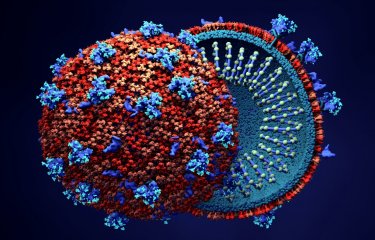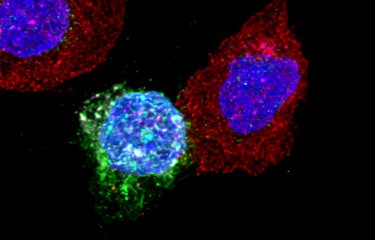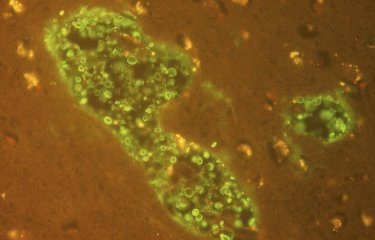Case of Geneva patient presented in the prestigious scientific journal Nature Medicine.
A total of seven individuals worldwide (two patients in Berlin and patients in London, Düsseldorf, New York, City of Hope and Geneva) are considered likely to have been cured or to be in long-term remission of HIV infection after receiving a bone marrow transplant to treat blood cancer. Romuald, the Geneva patient, who is being monitored at Geneva University Hospitals (HUG), is the only one to have experienced HIV remission following a bone marrow transplant without the CCR5-delta 32 mutation. This rare genetic mutation is known to make CD4 cells naturally resistant to HIV.
The case published in Nature Medicine was part of a study coordinated by Professor Alexandra Calmy, MD, PhD, Director of the HIV/AIDS Unit in the Division of Infectious Diseases at Geneva University Hospitals (HUG) and Vice-Dean in the Faculty of Medicine at the University of Geneva (UNIGE), and Professor Asier Sáez-Cirión, Head of the Viral Reservoirs and Immune Control Unit at the Institut Pasteur (Paris), in collaboration with the Institut Cochin and the IciStem consortium.
Unlike in previous cases, where the presence of the CCR5-delta 32 mutation seems to have played a decisive role in the HIV outcome, the study published shows that the Geneva patient's cells remain susceptible to HIV infection. Despite this, the virus remains undetectable in the patient nearly three years after antiretroviral treatment was stopped.
By closely monitoring the patient over an extended period, the scientists were able to demonstrate a progressive reduction in the viral reservoir following the transplant. Virus-carrying cells capable of multiplying, which could be easily detected before the transplant, were no longer detectable in the most recent analyses.
The article, published in Nature Medicine, presents these results together with the hypotheses that the UNIGE, HUG and Institut Pasteur teams are working on to try to explain why this patient has entered remission. The presence of innate immune cells with strong anti-HIV potential could prevent a rebound in the virus even if there may still be some infected cells in the body. The immunomodulatory treatment that the patient is receiving to control graft-versus-host reactions, which he has repeatedly experienced since the transplant, could also help prevent viral reactivation. Finally, these graft-versus-host reactions may have led to the viral reservoir being eliminated so effectively that the CCR5-delta 32 mutation is no longer necessary as no virus capable of multiplying remains in the body. These hypotheses open up promising avenues for research aimed at achieving remission for HIV infection.
Source
Sustained HIV remission after allogeneic hematopoietic stem cell transplantation with wild-type CCR5 donor cells, Nature Medicine, September 2, 2024
Asier Sáez-Cirión1,2, Anne-Claire Mamez3, Véronique Avettand-Fenoel4,5, Mitja Nabergoj6, Caroline Passaes1,2, Paul Thoueille7,8, Laurent Decosterd7, Maxime Hentzien9, Federico Perdomo-Celis2, Maria Salgado10,11,12, Monique Nijhuis13,14, Adeline Melard4, Elise Gardiennet4, Valérie Lorin15, Valérie Monceaux1,2, Anais Chapel1,2, Mael Gourves1, Marine Lechartier1, Hugo Mouquet15, Annemarie Wensing13,16, Javier Martínez Picado10,11,12,17,18, Sabine Yerly19, Mathieu Rougemont20, Alexandra Calmy9
1 Institut Pasteur, Université Paris Cité, Viral reservoirs and immune control unit, Paris, France
2 Institut Pasteur, Université Paris Cité, HIV Inflammation and Persistence unit, Paris, France
3 Division of Hematology, Department of Oncology, Geneva University Hospitals, Geneva, Switzerland
4 Institut Cochin - CNRS 8104 / INSERM U1016 / Université de Paris, Paris, France
5 Université d’Orléans, LI2RSO, Virologie, CHU d’Orléans, France
6 Institut Central des Hôpitaux, Sion, Switzerland
7 Service of Clinical Pharmacology, Department of Laboratory Medicine and Pathology, Lausanne University Hospital and University of Lausanne, Lausanne, Switzerland
8 Service of Clinical Pharmacology, Department of Medicine, Lausanne University Hospital and University of Lausanne, Lausanne, Switzerland
9 HIV/AIDS Unit, Division of Infectious Diseases, Geneva University Hospitals, Geneva, Switzerland
10 IrsiCaixa, Badalona, Spain
11 Germans Trias i Pujol Research Institute, Badalona, Spain
12 CIBERINFEC, Instituto de Salud Carlos III, Madrid, Spain
13 Translational Virology Research Group. Department of Global Public Health & Bioethics, Julius Center for Health Sciences and Primary Care, University Medical Center Utrecht, Utrecht, The Netherlands
14 HIV Pathogenesis Research Unit, Faculty of Health Sciences, University of the Witwatersrand, Johannesburg, South Africa
15 Institut Pasteur, Université Paris Cité, Inserm U1222, Humoral Immunology unit, Paris, France
16 Ezintsha, Faculty of Health Sciences, University of the Witwatersrand, Johannesburg, South Africa
17 UVic-UCC, Vic, Spain
18 ICREA, Barcelona, Spain
19 Geneva University Hospitals, Laboratory of Virology, Geneva, Switzerland
20 Private practitioner, Geneva, Switzerland





